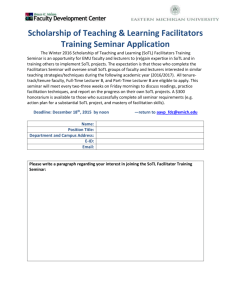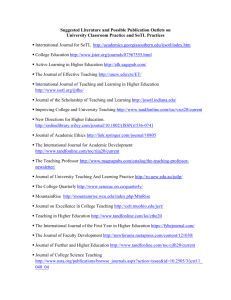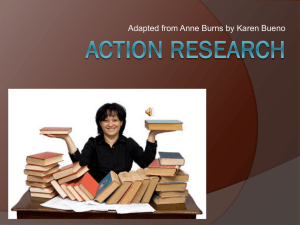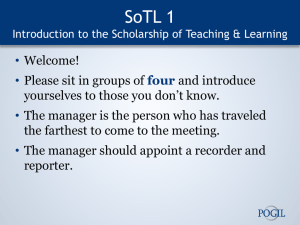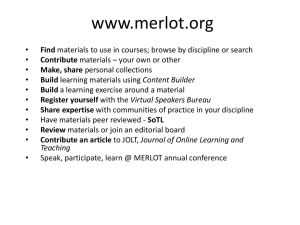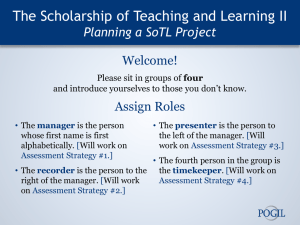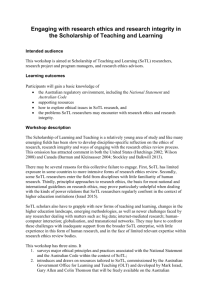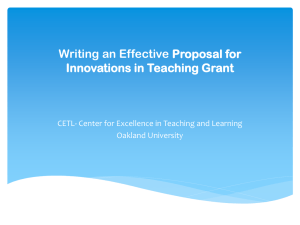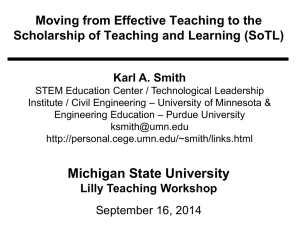Application for the Open University to become formally affiliated to
advertisement
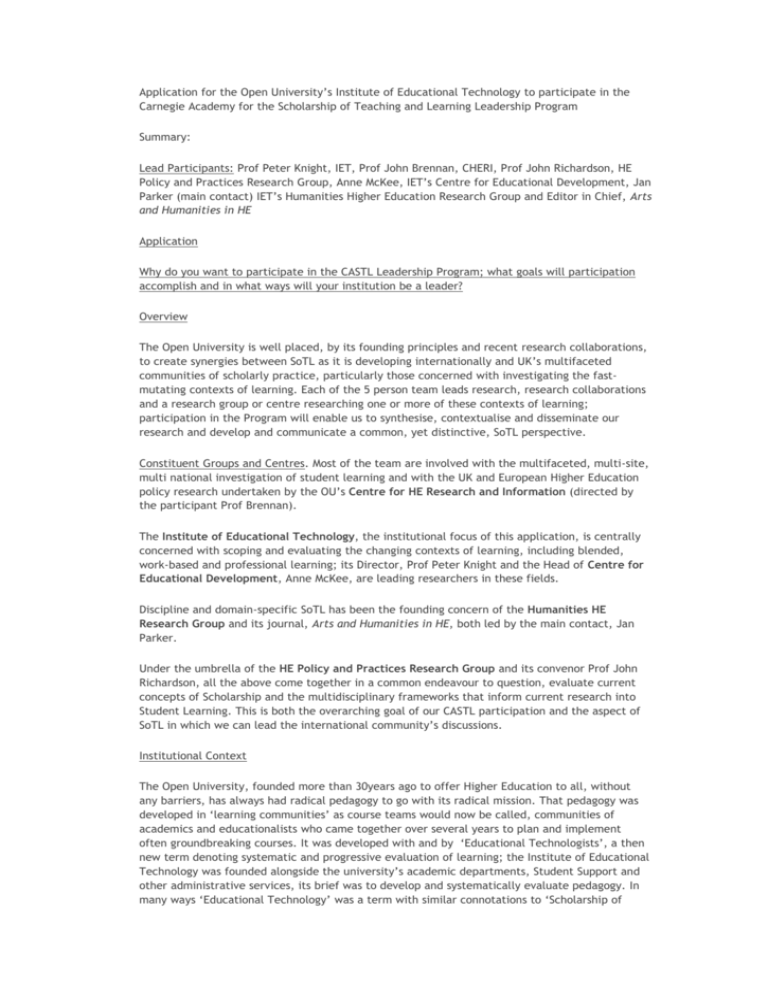
Application for the Open University’s Institute of Educational Technology to participate in the Carnegie Academy for the Scholarship of Teaching and Learning Leadership Program Summary: Lead Participants: Prof Peter Knight, IET, Prof John Brennan, CHERI, Prof John Richardson, HE Policy and Practices Research Group, Anne McKee, IET’s Centre for Educational Development, Jan Parker (main contact) IET’s Humanities Higher Education Research Group and Editor in Chief, Arts and Humanities in HE Application Why do you want to participate in the CASTL Leadership Program; what goals will participation accomplish and in what ways will your institution be a leader? Overview The Open University is well placed, by its founding principles and recent research collaborations, to create synergies between SoTL as it is developing internationally and UK’s multifaceted communities of scholarly practice, particularly those concerned with investigating the fastmutating contexts of learning. Each of the 5 person team leads research, research collaborations and a research group or centre researching one or more of these contexts of learning; participation in the Program will enable us to synthesise, contextualise and disseminate our research and develop and communicate a common, yet distinctive, SoTL perspective. Constituent Groups and Centres. Most of the team are involved with the multifaceted, multi-site, multi national investigation of student learning and with the UK and European Higher Education policy research undertaken by the OU’s Centre for HE Research and Information (directed by the participant Prof Brennan). The Institute of Educational Technology, the institutional focus of this application, is centrally concerned with scoping and evaluating the changing contexts of learning, including blended, work-based and professional learning; its Director, Prof Peter Knight and the Head of Centre for Educational Development, Anne McKee, are leading researchers in these fields. Discipline and domain-specific SoTL has been the founding concern of the Humanities HE Research Group and its journal, Arts and Humanities in HE, both led by the main contact, Jan Parker. Under the umbrella of the HE Policy and Practices Research Group and its convenor Prof John Richardson, all the above come together in a common endeavour to question, evaluate current concepts of Scholarship and the multidisciplinary frameworks that inform current research into Student Learning. This is both the overarching goal of our CASTL participation and the aspect of SoTL in which we can lead the international community’s discussions. Institutional Context The Open University, founded more than 30years ago to offer Higher Education to all, without any barriers, has always had radical pedagogy to go with its radical mission. That pedagogy was developed in ‘learning communities’ as course teams would now be called, communities of academics and educationalists who came together over several years to plan and implement often groundbreaking courses. It was developed with and by ‘Educational Technologists’, a then new term denoting systematic and progressive evaluation of learning; the Institute of Educational Technology was founded alongside the university’s academic departments, Student Support and other administrative services, its brief was to develop and systematically evaluate pedagogy. In many ways ‘Educational Technology’ was a term with similar connotations to ‘Scholarship of Teaching and Learning’, denoting a community of pedagogic scholars devoted to systematically evaluating learning and teaching in context. Importantly Educational Technologists from the start worked with the ‘Scholars of Inquiry’ to develop integrated and pedagogicaly led curricula, curricula that were and are then comprehensively evaluated in delivery and the results fed back into the planning of those and future courses. Each course planned and written, each course as presented, each student’s learning experience is researched and data fed back to course and presentation teams. Courses were developed according to principles of student-centred learning…almost before such a phrase existed. IET members work with course teams to advise on appropriate pedagaogic principles and on course design, a dialectic between innovative course goals together with innovative multimedia course presentation and continuous philosophy of student-centred learning; as pedagogic experts, they sit on lecturer appointments boards to ensure that appointments are made on the basis of teaching as well as research calibre and potential. The Open University therefore was a breakthrough in Higher Education – a university with literally no entrance barriers and dedicated to systematic investigation of and improvement of student learning. Although IET has always researched, advised and published, institutional demands have taken priority; the Centre for HE Research and Information, meanwhile has focused on the high level policy advising and informing aspect of its work. It is only with the founding of what is thought to be the largest UK centre for Educational research, the Centre for Research in Education and Educational Technology, that the present group has come together to developing a common research agenda. That agenda, though differently inflected, is compatible with that of CASTL and would be considerably facilitated by strengthening the several research connections that members have with the Carnegie Foundation into a formal affiliation to CASTL. Over the 30 plus years since its foundation, with many international consultations and international book series and journals to its name, IET has resisted the pigeonholing of its pedagogic principles. Expertise and international prestige we have, certainly, in Blended, Open, Distance, Lifelong, Professional and Work-based learning as well a Higher Education. But the decades of course and student learning surveys, institutional and policy research and the international projects have emphasised that which is common about student learning, rather than that which is situational and context- or delivery-medium related. Since the formation of the Higher Education Policy and Practices Research Group, which brought together the research of such disparate Centres as Centre for HE Research and Information, the Centre for Education in Medicine, Centre for Excellence in Work-based Professional Learning, the Humanities Higher Education Research Group, a shared perspective has developed. We share an agenda, concerns and common values with the Carnegie Foundation, with whom we have had institutional and personal contacts since 2000. We wish to offer the Carnegie Academy for the Scholarship of Teaching and Learning a UK based, European-informed ‘take’ on SoTL in and for open liberal education. Activities to meet this goal Within the institution, we will undertake a quarterly OU ‘Scholarship of Teaching and Learning’ audit, published on the award winning Knowledge Network and with dedicated open authored workspace and also published to the community in quarterly e-newsletters We will formalise our disparate research collaborations (CHERI and HERG have research associates from many UK institutions; all 5 of us as individual researchers, evaluators and assessors, project leaders and Editors head teams of researchers in the UK and Europe) into a UK Carnegie SoTL methodological research network, charged with annual presentations at a colloquium and publication both to CASTL and, via our journal and newsletter, to the international HE community. This network will be charged with the evaluation and dissemination of methodological implications of SoTL work – implications for, eg, Academic Identity and professional academic development; professional standards; HE policy; modelling student learning, domain and disciplinary learning; HE structure etc etc. The network will be charged with subjecting the terms of the SoTL ‘evidence base’ to methodological scrutiny, to unpack preconceptions and pedagogic and epistemological implications of terms all too easily slipping into common discourse. Terms that may come under SoTL scrutiny may include such ‘hot terms’ as ‘identity’ ‘access’, ‘widening participation’ ‘retention’, ‘diversity’, ‘learner styles’, ‘learner engagement’, ‘social practice’, ‘affordances’ etc) It is expected that this will build towards a special SoTL Methodology publication – edited book or Special Issue of a journal, by the end of the term. We will hold an annual SoTL themed colloquium, open without charge to UK Scholars of T and L We will formalise our longstanding research interest in domain and discipline specific learning, into disciplines as discourse communities, as Trading Zones (Mills and Huber 2005)and as communities of practice (Parker 2002) by reinstating an annual colloquium on disciplinary learning We will embark on an intercultural investigation of the use and embedding of Scholarship as a concept in the UK and Europe. Starting with collaborations with Institute of Education, London, Bremen and Lille, we undertake an investigation of the implications of Scholarship, Wissenshaft and La didactique for and in university structures and sense of [academic]self. We will lead on the area of the Scholarship of Professional and Work-based Teaching and Learning. As the centre of the UK’s Centre of Excellence for Work-based learning, the Centre for Education in Medicine, and with lead members with a long established reputation for practice-based and professional education, we are perfectly placed to evaluate the commonalities and differences between the Scholarship of university and professional and work based learning and teaching. Participation and SoTL activities, above, will accomplish several important goals for IET/HEPPRG/CHERI Coordinate, synthesise and strengthen, because of the need to report externally to CASTL, our reporting mechanisms about the implications for SoTL of our different areas of work Consolidate under the CASTL ‘banner’ conceptual work on student learning, disciplinarity, the interface between professional and university learning, etc Bring a fully international and Carnegie perspective to our research and evaluation of UK student learning (including blended, work-based and professional learning) So contributing to and benefiting from a model of SoTL differences and commonalities across institutions and countries preventing insularity of thinking We will provide leadership in 1) Developing Dialogues about SoTL Methodology Integrating data from multifaceted research projects (incorporating qualitative & quantitative research methods) Integrating data from UK-European longitudinal, multi-institution and multi-site projects 2) Developing Dialogues about Paradigm development SoTL and/of the disciplines (building on HERG’s work with Mary Huber) SoTL and/of professional/work-based/lifelong learning Culturally specific aspects of SoTL 3) (Taking learning to be context-dependent and teaching as a social practice) Investigating Contexts of learning – establishing difference and commonalities. To which scholarship of teaching and learning institutional theme (see descriptions below) will you contribute, and what will you bring to this aspect of the work and the movement? Our research, colloquia, reports and discussion will contribute most directly to G ‘ Assessment, Accreditation, Accountability and the Scholarship of Teaching and Learning’ and C ‘Liberal Education and the Scholarship of Teaching and Learning’. Our policy, institutional and professional education research will add a double extra focus to G -offering a UK and European perspective on student learning generally and, off and beyond campus, on continuing, professional and work-based learning. (We note that the latest newsletter calls for Institutional Researchers to be included in SoTL – the bridge between institutional, project and policy researchers is one that we are continuously attempting to build.) Our disciplinary and domain-specific learning colloquia, research and publications, our methodological work and our ‘SoTL at the frontiers’ programme will contribute to establishing the parameters of Liberal Education and SoTL. As above, we will add an UK-based international dimension to discussions about the parameters and key terms of SoTL, and about how SoTL is embedded in other learning contexts. We will bring a general intercultural awareness and a specific UK-contribution to the development of an internationally derived and applicable SoTL discourse and methodology. We will bring existing collaborations with Centre for New Development in Learning and Scholarship, CNDLS, Georgetown and with the Knight Institute for Writing in the Disciplines, Cornell into our SoTL programme of activities What do individual team members bring to the work; why these people? Each is the director of the constituent research group, centre or institute: ie Prof Peter Knight, Director, Institute of Educational Technology; Prof John Brennan, Director, Centre for Higher Education Research and Information, Anne McKee, Head, Centre for Educational Development, Prof John Richardson, Convenor, HE Policy and Practices Research Group, Jan Parker, Chair, Humanities HE Research Group and founder Editor in Chief of Arts and Humanities in HE. All are leaders, in every sense of the word, of SoTL in their area, inside but also outside the Open University and all have international reputations in their field. The synergies and collaborations are extensive: Peter Knight, John Richardson and Jan Parker are all Research Associates of CHERI; the major SoTL project currently under investigation, the International Economic and Social Science Research Council funded ‘Social and Organisational Mediation of University Learning’ (aka, What is really learned at university?’) has John Brennan and John Richardson as principal investigators, Peter Knight was founding director of both the Centre for Excellence of Work-based professional learning and the Centre for Educational Development; Anne McKee succeeded him in the latter post. What impact will result from participation; how will it be documented, evaluated? All the institutional, policy, practice and paradigm development research undertaken by the constituent groups is already fully documented and evaluated, according to the philosophy that underpinned IET and the Open University’s foundational mission. The impact of our joining CASTL will be to disseminate not just our results and data but the all important implications for the application of SoTL in other contexts (virtual and mixed campuses, professional and work-based learning, international HE systems, institutions and learning contexts). What products will result from participation; how will they be disseminated? This group is particularly well positioned to synthesise and disseminate the SoTL implications to the UK and internationally. The award-winning Knowledge Network will have a SoTL work space for all Open University teachers and researchers, including action research by individual tutors, the results of which will be reported in the SoTL newsletter and on the institutional open access SoTL webpage. All the activities above will be reported to CASTL and after discussion and CASTL input will be written into public outcomes ‘Scholarship of Teaching and Learning’ audit, published on the award winning Knowledge Network and with dedicated open authored workspace and also published to the community in quarterly e-newsletters We will formalise our disparate research collaborations (CHERI and HERG have research associates from many UK institutions; all 5 of us as individual researchers, evaluators and assessors, project leaders and Editors head teams of researchers in the UK and Europe) into a UK Carnegie SoTL methodological research network, charged with annual presentations at a colloquium and publication both to CASTL and, via our journal and newsletter, to the international HE community. The evaluation and dissemination of methodological implications which will build towards a special SoTL Methodology publication subjecting the terms of the SoTL ‘evidence base’ to methodological scrutiny eg ‘identity’ ‘access’, ‘widening participation’ ‘retention’, ‘diversity and difference’, ‘learner styles’, ‘learner engagement’, ‘social practice’, ‘affordances’ etc) An annual themed colloquium on SoTL, open without fee to UK Scholars of T and L An annual colloquium on disciplinary learning An intercultural investigation of the implications of Scholarship, Wissenshaft and La didactique for and in university structures and sense of [academic]self, to be published. A colloquium of the Scholarship of Professional and Work-based Teaching and Learning An edited book or Special Issue of a journal, by the end of the term, on Scholarship and Disciplinary Learning and/or SoTL in Other Contexts and/or Scholarship and the New Hermeneutic
